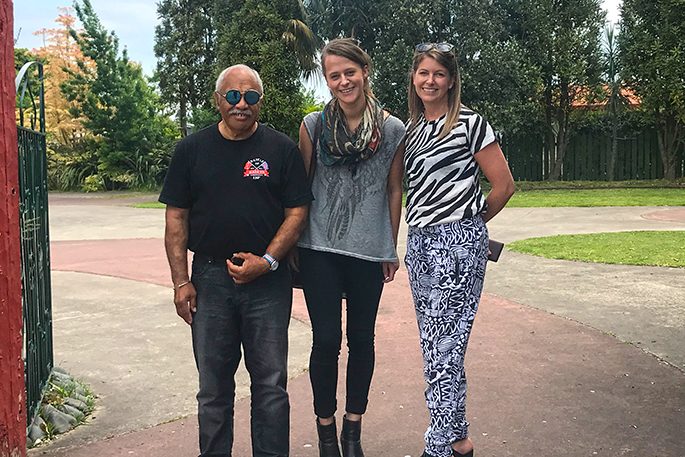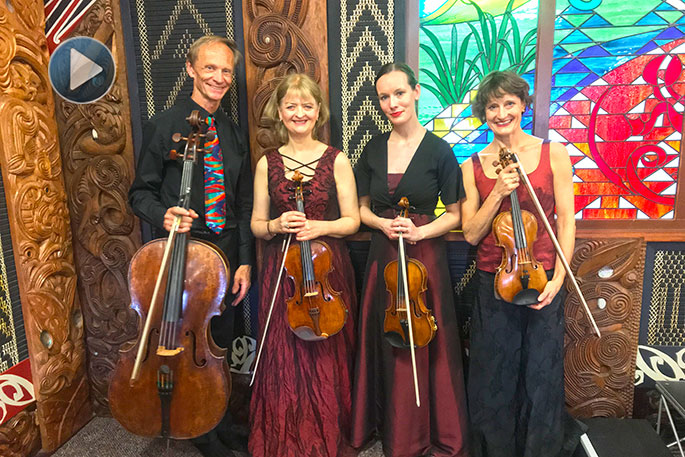The NZ String Quartet performed at Tauranga's Huria Marae on Wednesday as part of the WW100 Armistice Day Commemoration. The two free concerts were held at 2pm and 6.30pm, and featured music that was felt to resonate with a war-time theme.
The quartet is made up of cellist Rolf Gjelsten, Violist Gillian Ansell, and violinists Monique Lapins and Helene Pohl, all from Wellington.
The string quartet has performed at Huria Marae previously in 2014, as part of the Battle of Gate Pa 100 year commemorations and found the acoustics to be exceptional. Ngāi Tamarāwaho hapū organiser Buddy Mikaere felt inviting them back to perform again in the Tamateapokaiwhenua Meeting House would be a fitting way to mark the end of the 100th year commemorations, paying tribute to the soldiers from Tauranga who went to World War One.
The free concert was arranged with Creative Bay of Plenty, with sponsorship from TECT, Farmer Autovillage, Legacy Trust, Holland Beckett law, Tauriko Business Estate, Farmers, Whitcoulls, Pascoes the Jewellers and Metro Marketing.
The first half of the performance featured music from NZ composer Gareth Farr, Mozart, Janacek and Puccini.
Gareth Farr's composition ‘He Poroporoaki' which means ‘saying goodbye', is a ‘deconstructed version of ‘Now is the Hour' (Po Atarau/Haere Ra) which was used to farewell Māori soldiers going to World War 1.
Mozart's ‘Movements from String Quartet in G' was performed at the evening performance only, and featured the Allegro vivace assai and Andante cantabile from Mozart's Strong Quartet n.o 14.
Written between World War 1 and 2, in 1928, by Czech composer Leoš Janáček, ‘Moderato' from String Quartet ‘Intimate Letters' captures the intense emotions Janacek felt for Kamila Stosslova, the woman he sent hundreds of letters to.
Giacomo Puccini's ‘Crisantemi', meaning ‘Chrysanthemums', is a short piece written by the composer as a memorial to his friend, the Duke of Savoy, formerly King Amadeo I of Spain, who died in 1980. Giacomo is an Italian composer who lived from 1858 to 1924, and has been called ‘the greatest composer of Italian opera after Verdi'. He said he wrote Crisantemi in one night after he heard the news of his friend's death. The original version for string quartet is seldom heard, as there is also a string orchestra version which is more often performed. He is a master of writing for strings, as can be heard in this work which has two melody themes running through it. It's intense, dark and sombre, paying tribute to his friend. In some countries of Europe, chrysanthemums also symbolize death, and are used only for funerals or on graves.
The second half of the performance featured Beethoven's ‘Rasumovsky', a string quartet in C, a work in four movements incorporating Russian themes. It was followed by a moving arrangement of Pokarekare ana by NZ composer John Pasthas. Pokarekare ana is a traditional lovesong popularised by Māori soldiers during WW1. The NZ String Quartet gave it a poignancy that is often felt during a bugle's playing of The Last Post, and likewise commemorates those who have been killed in war.
The performances were arranged to coincide with the WW100 Armistice Commemorations, but also to highlight the NZ War Memorial Museum project in Le Quesnoy in northern France. Koha was collected on entry to go toward the museum project which also commemorates the centenary of the end of World War One.
The concert was followed with refreshments and a meet-the-musicians opportunity.

Buddy Mikaere with Meg Davis and Alicia Beech from Creative Bay of Plenty



0 comments
Leave a Comment
You must be logged in to make a comment.